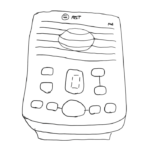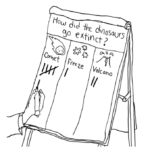
When I was three years old, I punched a kid. It was the first and last punch that I ever threw.
Here’s how it went down: it was morning play time. I was in the blocks corner, which was my very favorite corner. I loved blocks. I mean, I really, really loved blocks. A lot of three-year-olds do, I guess.
There were two sets of blocks in my life. First, there were my home blocks. My home blocks were big, rectangular, and made of cardboard. They came in bright, basic colors: red, yellow, green, blue. Every night, when my mom got home from work, we took the blocks and built a staircase together. Then, we marched my stuffed animals up and down, up and down, up and down. We called this game “steps.”
Then, there were my school blocks. These blocks were very different from my home blocks, and that was exciting. School blocks were small. They were light tan. They were made of really heavy wood. And they came in SO many shapes: square, brick, fat triangle, skinny triangle, rectangle, super-long rectangle, bridge. God, I loved that bridge. You know the one! School blocks filled three shelves, plus two blue buckets on the side. With home blocks, I built steps. With school blocks I built whole worlds.
Back to that morning. I was minding my own business, happy as a clam, playing with the blocks that I loved. Another kid was playing with the blocks too, which was fine; there were more than enough to go around. But then, something toppled. I’ll be honest with you – I don’t remember exactly what it was. I don’t remember if it was my tower or his. I don’t remember whether we exchanged words. But I’ll tell you what I do remember:
He punched me in the stomach. (Jerk!).
I stood for a second, winded. Then, I heard my mother’s voice, somewhere in the back of my head:
“Andy, if someone ever hits you, you hit them back.”
Well, okay. I was a good boy. I listened to my mother.
I punched the other kid in the jaw.
He wailed.
The teacher yelled from across the room:
“ANDY. We do NOT hit people.”
Moments later, my teacher was towering over me. Hot tears welled in my eyes.
“He hit me first!” I explained.
“That doesn’t matter,” my teacher said. “In this class, we do not hit. Go to the house corner. Now.”
What? I thought. That doesn’t MATTER? Of course that matters! He hit ME first!
I tried again, slowing down my words:
“But HE … hit ME … first.”
My teacher glowered and took a breath.
“Andy, it really doesn’t matter who hit who first. We don’t hit people in this class. So go to the house corner. NOW.”
I understood, no hitting. That made sense. I wasn’t dumb. But I also understood what my mother had told me. No hitting, except when someone hits you first. There were exceptions. They break the rule, you break the rule. To protect yourself. That made sense, too.
Surely, my teacher knew this. Didn’t adults know all the rules?
I tried again.
“But my mom said, if someone…”
She cut me off again. “It doesn’t matter what your mom said. In this class, we don’t hit. Period. I’m not explaining it again. Go to the house corner.” She pointed, then raised her voice, just enough: “RIGHT. NOW.”
I bit my lip. My chest heaved up and down. Hot tears rolled down my cheeks. But I did as I was told.
When I got to the house corner, I walked right past the three girls playing there. I beelined to a small blue sofa with two gymnastic-mat cushions. A saucer of plastic spaghetti was lying on one of them. I sat on the other cushion and reached for the fake pasta. I dug my angry fingers into the rubbery noodles. The pasta was cold and unpleasant. It was also the ugliest shade of banana yellow. But I looked at it anyway, too mad to look anywhere else. I breathed in and gripped the noodles even harder. I stared for what seemed like hours.
I sat there, fuming, trying to make sense of everything that had happened. I could not understand why I was in trouble. He had punched me first. I had only punched back. I had listened to my mother, who I loved. But my teacher, who I also loved, was now mad at me, because I had broken her rules. My mom’s rules and my teacher’s rules were not the same. This was very confusing. And scary. What would my mother say when she found out? Would she be mad, too? Or would she be proud? It was hard to tell, since, apparently, adults’ rules were not always the same.
I was also confused about my punishment. Yes, I had been removed from my blocks, which totally sucked. But sitting in the house corner honestly wasn’t so bad. Once I was there, my teacher didn’t come over to yell at me any further, or even to discuss what had happened. In time, I got up from the couch and started to play with the girls, who were super nice. They became my fast friends. They gave me an enthusiastic tour of the house corner and showed off its many toys. The house toys were quite fun. I particularly enjoyed the stackable ice cream scoops and beeping microwave.
So… why was the house corner a punishment? I wondered about that. I knew the house corner was “for girls.” Maybe being a boy in the house corner was supposed to be punishment enough. Maybe I was meant to feel embarrassed or depressed, being there. But honestly, I was having a pretty good time. So what did that mean?
Play time came and went, but the teacher never explained the punishment to me. And she did not mention the fight for the rest of the day. I ate graham crackers at snack and listened during story time. For afternoon play, I went back to the house corner with my new friends.
Later on, when my mother came to pick me up, I ran to give her a hug, like always. I pressed my cheek against her scratchy work stockings. Then, I realized that she was speaking with the teacher, quietly and at length. I knew what they were discussing. I got scared.
My teacher and my mother finished talking and smiled at one another. Mom took my hand. She didn’t say much as we walked to the car. Once inside, before turning the key in the ignition, she looked over her right shoulder. She made eye contact with me in the backseat.
“I spoke to your teacher,” she said.
I remained silent.
“Did he hit you first?”
“Yes,” I said.
“Good,” she said. She waited for a few seconds. Then, she affirmed: “You were a good boy, to fight back.”
And that’s the story of my first and last punch.
***
In the course of an entire life, it’s hard to judge how important a single moment is. But I’ve always wondered whether this punch, on the carpet in Pre-K, is the reason that I never fought again. I’ve wondered whether the awful feeling I felt on that carpet – the mix of anger and fear and confusion and shame – turned me into a lifelong pacifist.
And I’ve wondered about that house corner. Growing up, I always trusted girls more than boys. I had a lot more girl-friends than guy-friends. And I always felt like there was something wrong with me because of that. I admire that your generation is starting to think and talk about gender in a much more fluid way. I think that’s just fantastic. Because if a boy wants to hang out in the house corner, so what! And if a girl wants to play with blocks, great! And maybe we should stop being so obsessed with being boys and girls in the first place.
But when I threw my first punch, it was 1989, and I was sent to the house corner as punishment. What kind of message did that send? And did I carry that message with me?
And then there were the rules. I wonder if this is the moment that I began to understand the world in relative terms; to grasp the idea that two perspectives can be true at the same time. My teacher’s rules were different from my mother’s rules. That’s actually a pretty big idea, if you think about it: that people have different rules in this world. Because if rules can be different, opinions and beliefs and values can be different, too. Actually, I think a big part of life is navigating rules: figuring out what the rules are, based on where you are and who you’re with, and whether or not you agree with them. And, eventually, figuring out what your own rules are, and deciding to live by them, no matter what.
Maybe I started to figure all that out because of my first punch. Or maybe not. A lot of psychologists will tell you that, at age three, it was not possible for me to think this way, in relative terms. But those are their rules. I’m just telling it how it was, for me.
I wonder, too, if this punch changed the way that I understood my mother. This might have been the moment when I started to love my mother not only for her warmth, but also for her strength. At home, she was all smiles and hugs. But out in the world, she was a tough cookie. She was a volunteer firefighter. She had divorced my father when she needed to, at a time when divorce was not so common. And she was raising me, on her own, in a town where that was not so normal.
At age three, I didn’t necessarily know or understand all of that. But I do wonder if it was at age three, on the day of the punch, that I began to see and love, beneath the steps and stuffed animals and scratchy-stocking hugs, a mother who stood up for her own rules in this world.
***
Of course, I could be wrong. Maybe this memory, this moment, didn’t matter all that much. It’s kind of hard, maybe impossible, to understand why some moments stick.
Why do I remember the Pre-K punch so well? Why is this the first important lesson of my life?
I can’t ever know for sure. But I do remember that morning, which seems important. I remember that it was play time. I remember that I was among the blocks. I remember that when something toppled, he punched first and I punched back. I remember that my teacher had different rules than my mother and that I cried clutching plastic spaghetti. I remember that the girls were nice and that the house corner was fun and that, when all was said and done, my mother had turned over her right shoulder and stood up for me. And for herself.
I was a good boy to fight back.



